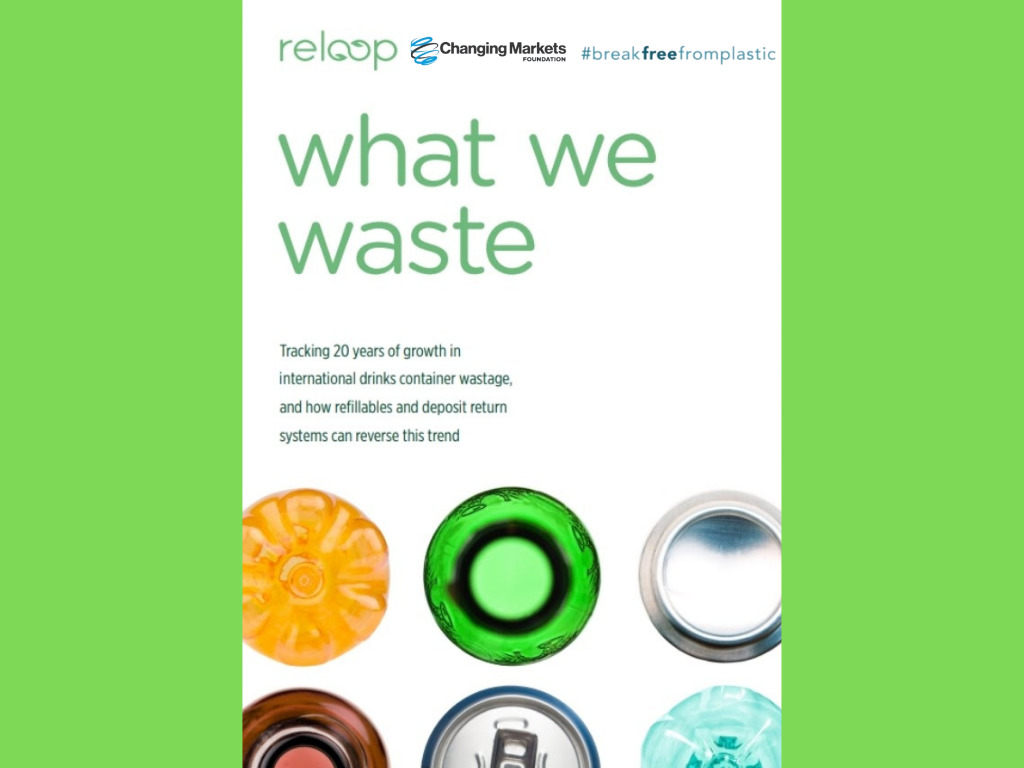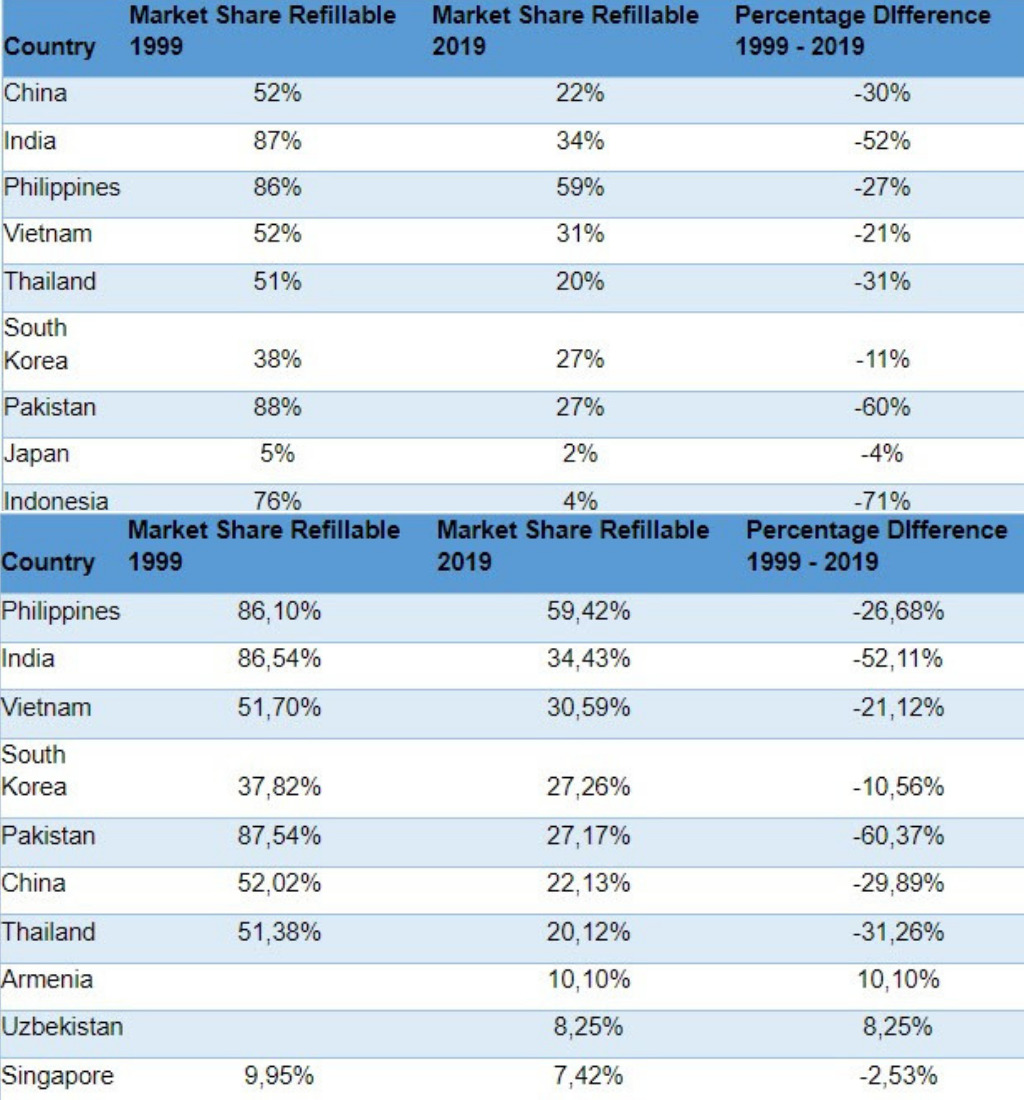China, India, Philippines Among Top Asian Countries To Record Sharpest Decline Of Refillables, Report Finds
4 Mins Read
According to a new report by international non-profit Reloop, that was released in a media briefing together with Changing Markets Foundation and the #breakfreefromplastic movement, single-use beverage containers have been replacing refillables rapidly across the world leading to a tremendous increase in waste and pollution.
The report, titled ‘What We Waste’, analyzes data from over 93 countries to understand the decline in the usage of refillable containers in the beverage industry over a span of 20 years.
For the first time, the report provides in-depth research into the positive outcome of the deposit return systems (DRS), that applies a surcharge on a product and when it is returned, a refund or rebate is given, and unlike refillables, these systems are intended to recycle the bottles and not reuse them, however in several countries, the same collection infrastructure is used for both systems. The report further looks into how these systems can help limit waste and prevent materials from being sent off to landfills or incinerated.
The report found that between 1999 and 2019, sales of beverage containers and the amount sold in PET plastic, both doubled, with the latter increasing from 17% to 41% leading to massive accumulation of waste in countries that saw an increase in single-use plastics or containers.
At the same time, it highlights that those countries with a larger market share for refillables had less waste.

Overall the market share for refillables has declined, with 10 countries that had reported the highest usage of this material experiencing a steep decline, from 60% to 29% over the last 20 years.
Focussing on Asia, the largest numbers were attributed to China, whose market share of refillables fell from 52% in 1999 to 22% in 2019. Other countries that reported sharp declines include India, the Philippines, Indonesia, Thailand and Vietnam.
In a press release seen by Green Queen, CEO and co-founder of Reloop,that works to bring change at all levels of resource and waste policy, Clarissa Morawski, said: “In most Asian countries, the crucial next step policy-makers should consider will be how to support existing refillable markets, and to consider how to expand them, with the right regulation and incentives. Every single percentage point of market share that switches to refillables across the region will substantially reduce wastage. This same infrastructure can also, in time, be developed into full deposit return systems to capture those remaining non-refillable cans and bottles.”

In most Asian countries, the crucial next step policy-makers should consider will be how to support existing refillable markets, and to consider how to expand them, with the right regulation and incentives
Clarissa Morawski, CEO and co-founder of Reloop
In addition, the report calls on governments to protect the refillable market share and execute recycling programs on metal cans and glass to avoid making the waste crisis worse.
Global Coordinator of Break Free from Plastic, Von Hernandez, said that the future is not disposable and the plastic pollution crisis can be averted. “In countries like China, India, Vietnam and the Philippines, where there is still a significant market share for refillables, governments must provide the right policy signals not only to protect what’s left of the refillable sector but to expand and bring it back to a position of dominance. Companies that produce ever-increasing amounts of plastic pollution should be held accountable, while systems that avoid plastic waste must be encouraged and strongly supported. This is the kind of direction required to reverse the plastic pollution crisis and avert catastrophic climate change.”
READ: Return & Reuse: 8 Circular Packaging Companies To Watch In The Race To Close The Waste Loop
Every single percentage point of market share that switches to refillables across the region will substantially reduce wastage. This same infrastructure can also, in time, be developed into full deposit return systems to capture those remaining non-refillable cans and bottles
Clarissa Morawski, CEO and co-founder of Reloop
Additionally, the report lists information about how refillable and DRS can reduce waste in some countries, and can be used to predict the changes of this market in a country and to observe the impact of changing national recycling rates, in countries that this data isn’t publicly available.
For instance, if the entire region of Southeast Asia had similar refillable market shares as the Philippines, which has the highest of all ASEAN countries, around 15.4 billion plastic bottles could be prevented from ending up as waste and polluting the natural world.
“As part of the government’s effort to curb wastage from single-use plastics, it should look at instituting deposit return schemes in order to preserve and expand the markets for refillables. Instead of promoting problematic alternatives that result in more wastage, the government can invest more in this type of proven alternative solution.”, concluded Shania Cheng, coordinator of Plastic-Free China.
All images courtesy from Reuters.



